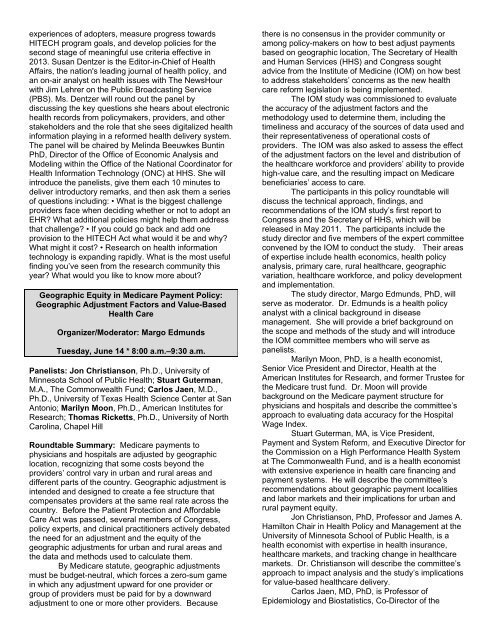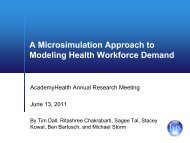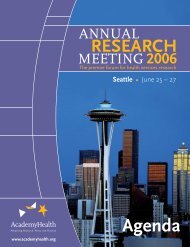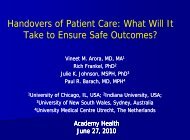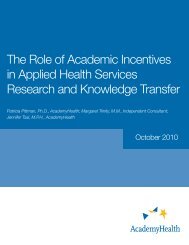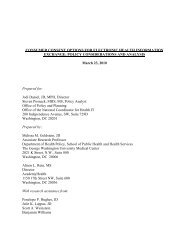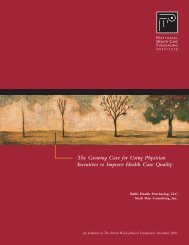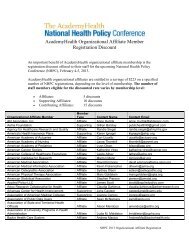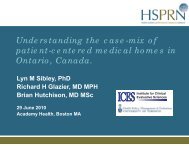Policy Roundtable Abstracts - AcademyHealth
Policy Roundtable Abstracts - AcademyHealth
Policy Roundtable Abstracts - AcademyHealth
Create successful ePaper yourself
Turn your PDF publications into a flip-book with our unique Google optimized e-Paper software.
experiences of adopters, measure progress towards<br />
HITECH program goals, and develop policies for the<br />
second stage of meaningful use criteria effective in<br />
2013. Susan Dentzer is the Editor-in-Chief of Health<br />
Affairs, the nation's leading journal of health policy, and<br />
an on-air analyst on health issues with The NewsHour<br />
with Jim Lehrer on the Public Broadcasting Service<br />
(PBS). Ms. Dentzer will round out the panel by<br />
discussing the key questions she hears about electronic<br />
health records from policymakers, providers, and other<br />
stakeholders and the role that she sees digitalized health<br />
information playing in a reformed health delivery system.<br />
The panel will be chaired by Melinda Beeuwkes Buntin<br />
PhD, Director of the Office of Economic Analysis and<br />
Modeling within the Office of the National Coordinator for<br />
Health Information Technology (ONC) at HHS. She will<br />
introduce the panelists, give them each 10 minutes to<br />
deliver introductory remarks, and then ask them a series<br />
of questions including: • What is the biggest challenge<br />
providers face when deciding whether or not to adopt an<br />
EHR What additional policies might help them address<br />
that challenge • If you could go back and add one<br />
provision to the HITECH Act what would it be and why<br />
What might it cost • Research on health information<br />
technology is expanding rapidly. What is the most useful<br />
finding you’ve seen from the research community this<br />
year What would you like to know more about<br />
Geographic Equity in Medicare Payment <strong>Policy</strong>:<br />
Geographic Adjustment Factors and Value-Based<br />
Health Care<br />
Organizer/Moderator: Margo Edmunds<br />
Tuesday, June 14 * 8:00 a.m.–9:30 a.m.<br />
Panelists: Jon Christianson, Ph.D., University of<br />
Minnesota School of Public Health; Stuart Guterman,<br />
M.A., The Commonwealth Fund; Carlos Jaen, M.D.,<br />
Ph.D., University of Texas Health Science Center at San<br />
Antonio; Marilyn Moon, Ph.D., American Institutes for<br />
Research; Thomas Ricketts, Ph.D., University of North<br />
Carolina, Chapel Hill<br />
<strong>Roundtable</strong> Summary: Medicare payments to<br />
physicians and hospitals are adjusted by geographic<br />
location, recognizing that some costs beyond the<br />
providers’ control vary in urban and rural areas and<br />
different parts of the country. Geographic adjustment is<br />
intended and designed to create a fee structure that<br />
compensates providers at the same real rate across the<br />
country. Before the Patient Protection and Affordable<br />
Care Act was passed, several members of Congress,<br />
policy experts, and clinical practitioners actively debated<br />
the need for an adjustment and the equity of the<br />
geographic adjustments for urban and rural areas and<br />
the data and methods used to calculate them.<br />
By Medicare statute, geographic adjustments<br />
must be budget-neutral, which forces a zero-sum game<br />
in which any adjustment upward for one provider or<br />
group of providers must be paid for by a downward<br />
adjustment to one or more other providers. Because<br />
there is no consensus in the provider community or<br />
among policy-makers on how to best adjust payments<br />
based on geographic location, The Secretary of Health<br />
and Human Services (HHS) and Congress sought<br />
advice from the Institute of Medicine (IOM) on how best<br />
to address stakeholders’ concerns as the new health<br />
care reform legislation is being implemented.<br />
The IOM study was commissioned to evaluate<br />
the accuracy of the adjustment factors and the<br />
methodology used to determine them, including the<br />
timeliness and accuracy of the sources of data used and<br />
their representativeness of operational costs of<br />
providers. The IOM was also asked to assess the effect<br />
of the adjustment factors on the level and distribution of<br />
the healthcare workforce and providers’ ability to provide<br />
high-value care, and the resulting impact on Medicare<br />
beneficiaries’ access to care.<br />
The participants in this policy roundtable will<br />
discuss the technical approach, findings, and<br />
recommendations of the IOM study’s first report to<br />
Congress and the Secretary of HHS, which will be<br />
released in May 2011. The participants include the<br />
study director and five members of the expert committee<br />
convened by the IOM to conduct the study. Their areas<br />
of expertise include health economics, health policy<br />
analysis, primary care, rural healthcare, geographic<br />
variation, healthcare workforce, and policy development<br />
and implementation.<br />
The study director, Margo Edmunds, PhD, will<br />
serve as moderator. Dr. Edmunds is a health policy<br />
analyst with a clinical background in disease<br />
management. She will provide a brief background on<br />
the scope and methods of the study and will introduce<br />
the IOM committee members who will serve as<br />
panelists.<br />
Marilyn Moon, PhD, is a health economist,<br />
Senior Vice President and Director, Health at the<br />
American Institutes for Research, and former Trustee for<br />
the Medicare trust fund. Dr. Moon will provide<br />
background on the Medicare payment structure for<br />
physicians and hospitals and describe the committee’s<br />
approach to evaluating data accuracy for the Hospital<br />
Wage Index.<br />
Stuart Guterman, MA, is Vice President,<br />
Payment and System Reform, and Executive Director for<br />
the Commission on a High Performance Health System<br />
at The Commonwealth Fund, and is a health economist<br />
with extensive experience in health care financing and<br />
payment systems. He will describe the committee’s<br />
recommendations about geographic payment localities<br />
and labor markets and their implications for urban and<br />
rural payment equity.<br />
Jon Christianson, PhD, Professor and James A.<br />
Hamilton Chair in Health <strong>Policy</strong> and Management at the<br />
University of Minnesota School of Public Health, is a<br />
health economist with expertise in health insurance,<br />
healthcare markets, and tracking change in healthcare<br />
markets. Dr. Christianson will describe the committee’s<br />
approach to impact analysis and the study’s implications<br />
for value-based healthcare delivery.<br />
Carlos Jaen, MD, PhD, is Professor of<br />
Epidemiology and Biostatistics, Co-Director of the


